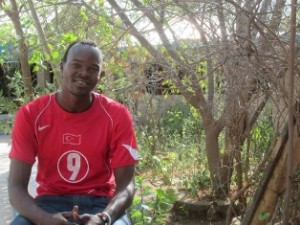Ryan P. Cumming
May 21, 2015
In this series of posts, we will take a closer look at some of the areas of work ELCA World Hunger supports domestically and internationally. Previously, we looked at relief and education. This week, our focus is on “advocacy.”
The Work We Do: Advocacy
What Is Advocacy?
Speak up!
Advocacy is a public witness to the gospel of Christ where the church speaks with and on behalf of others in need. It is the work the church does when it speaks up and out, lending its voice to support, to vindicate, and to challenge. One of the most visible forms of advocacy is public policy advocacy. This includes listening to the experiences of community members, lifting up these experiences during conversations with policymakers, and educating Lutherans about current priorities in government. It also includes working for change in public policy based on priorities drawn from ELCA social statements, Lutheran ministries, programs and projects around the world. Our public policy advocacy colleagues at the state, national and international levels are often in deep conversation with Lutherans in the ELCA and with our ecumenical partners about the impact of policies on hunger.
Advocacy doesn’t just happen in the halls of government, though. Any time we bring our voices to bear on issues of justice, we are advocating in the spirit of the church’s calling to be advocates of justice and mercy (ELCA, “Church in Society,” [1991], p. 6.) This can be something as seemingly small as writing a letter to the editor of a local newspaper to inform readers of the realities of hunger and poverty. Or, it can be correcting colleagues at work or friends at school whose prejudices disparage people facing hunger. Speaking up, being advocates, is central to the work we do together.
Many Lutherans do this often. When misinformation and xenophobia galvanized opposition to unaccompanied children crossing the border from Mexico this summer, Bishop Michael Rinehart (Gulf Coast Synod) used his blog to speak the truth and give voice to the realities many of these children face. In September 2014, hundreds of ELCA members joined others in the People’s Climate March in New York to bring attention to issues related to climate change. There are countless other examples.
ELCA World Hunger supports staff dedicated to public policy advocacy. The Lutheran Office for World Community (LOWC) in New York City is an office of the ELCA, but it also represents the Lutheran World Federation. The staff of LOWC advocate for peace, human rights, justice and better standards of living for all people. It monitors the United Nations on behalf of the ELCA and on behalf of the 72 million Christians represented by the LWF. Our ELCA Advocacy staff in Washington, DC, advocates with US policymakers on issues ranging from the Farm Bill to the Child Nutrition and WIC Reauthorization Act. And our eleven State Public Policy Offices (SPPOs) across the country are voices for change on issues like minimum wage, school breakfasts, and access to clean water.
Roots of Advocacy
Biblically, many people trace the roots of public policy advocacy to the Prophets. When Amos cries out for “justice in the gate” (5:15), he’s demanding just and fair court practices. And even modern-day political rhetoric hardly approaches the vitriol expressed by the prophet Isaiah: “How the faithful city has become a whore! She that was full of justice, righteousness lodged in her – but now murderers!…Your princes are rebels and companions of thieves!” (1:21-23a).
There are some limits to applying the prophets to public policy in the here-and-now, most notably the fact that we in the US don’t live in a theocracy, so purely religious arguments have little traction in the public square. But this is precisely where Lutheran theology steps in, providing a path for bringing faith to bear on public life in a way that doesn’t demand that a government be Christian in order to be good.
We have a name for this theology: two kingdoms. (I know, I know. Commence groaning.) The common name might not be the best to describe what is going on in this theology. A better phrase might be “God’s two ways of governing.” On the one hand, God “governs” the world through the gospel. This is the foundation of God’s reign in the perfect kingdom. Here, mercy, love and forgiveness are the guiding principles.
Of course, with sin, this doesn’t always work in the “real world.” Here, today, people suffer. People cheat. Greed runs rampant. Is there no grace to be found in our daily lives? Is our faith merely a matter of waiting for Heaven? No! Sin hasn’t left us to our own devices apart from God. Indeed, God graciously provides for us in another way as we await the fullness of God’s perfect reign. Here, God has established other structures and principles to help us live meaningful lives now: justice, peace, equity.
Human communities may not be perfect communities of love and mercy. But they can be communities of justice and peace, and this can give us a taste of what perfect justice and perfect peace might be like in God’s full reign. They can be communities in which the dignity of each person is protected and in which every person has an equal shot at a life lived without fear, without hunger, without oppression.
In baptism, Lutherans are called to build this kind of community – “to strive for justice and peace in all the earth.” Doing so is so central to who we are as the people of God that, according to the bible, we cannot be an authentic worshipping community without being a justice-seeking community:
In Isaiah’s words:
Yet day after day they seek me
and delight to know my ways,
as if they were a nation that practiced righteousness
and did not forsake the ordinance of their God;
they ask of me righteous judgments,
they delight to draw near to God.
‘Why do we fast, but you do not see?
Why humble ourselves, but you do not notice?’
Look, you serve your own interest on your fast-day,
and oppress all your workers.
Look, you fast only to quarrel and to fight
and to strike with a wicked fist.
Such fasting as you do today
will not make your voice heard on high.
Is such the fast that I choose,
a day to humble oneself?
Is it to bow down the head like a bulrush,
and to lie in sackcloth and ashes?
Will you call this a fast,
a day acceptable to the Lord?
Is not this the fast that I choose:
to loose the bonds of injustice,
to undo the thongs of the yoke,
to let the oppressed go free,
and to break every yoke? (Isaiah 58:2-6)
Or again, from Micah:
“With what shall I come before the Lord, and bow myself before God on high? Shall I come before him with burnt offerings, with calves a year old? Will the Lord be pleased with thousands of rams, with ten thousands of rivers of oil? Shall I give my firstborn for my transgression, the fruit of my body for the sin of my soul?” He has told you, O mortal, what is good; and what does the Lord require of you but to do justice, and to love kindness, and to walk humbly with your God? (Micah 6:8)
Advocacy – being voices of justice in an unjust world, voices of peace in the midst of conflict, and voices of solidarity amid marginalization – is central to who we are as church and central to our work to end hunger. As Lutherans, we believe God has ordained that we have governments, churches, families, and communities not so that some profit while others hunger but so that all may be fed. Our work as policy advocates and public advocates in other areas of our life is a key part of our role in God’s establishment of a world worth living in and, if the health outcomes of hunger are any indication, a world that is possible to live in.
Examples of Advocacy
In December 2014, ELCA Advocacy urged followers to support the ABLE Act, which passed in the US House of Representatives by a 404-17 vote. The ABLE Act would allow people with disabilities to set up savings accounts for housing, transportation, educational opportunities, and other expenses without jeopardizing their eligibility for Medicaid and Social Security benefits. The act was signed into law by President Barack Obama in January 2015.
Also in December 2014, the Secure Choice Savings Program Act was approved by the General Assembly of Illinois, with support from Lutheran Advocacy-Illinois. This act will give millions of private sector workers in Illinois the opportunity to save their own money for retirement by expanding access to employment-based retirement savings accounts, a benefit more than 2.5 million workers do not have. With food insecurity affecting nearly 15% of seniors in Illinois, this act could be a significant step in reducing hunger among retirees.
The Lutheran Office of Governmental Ministry in New Jersey is currently in the midst of working toward passage of a state-wide earned sick days bill in the Assembly. The bill has passed the Assembly Labor and Budget committees and is awaiting a full floor vote. It is a model earned-sick-days law that covers nearly all 1.2 million workers in the state who lack earned sick days. The majority of those who will benefit are low-wage workers earning less than $10 an hour. The bill allows workers to use earned sick days to care for themselves as well as all immediate family members when sick and to use earned sick days to deal with, relocate or find safe accommodations due to circumstances resulting from being a victim of domestic or sexual violence.
Learn more about ELCA Advocacy at the ELCA Advocacy blog: http://www.elca.org/blogs/advocacy
Sign up for ELCA Advocacy updates and alerts: http://www.capwiz.com/elca/mlm/signup/?ignore_cookie=1
Ryan P. Cumming, PH.D., is program director of hunger education for ELCA World Hunger. You can reach him at Ryan.Cumming@ELCA.org.








